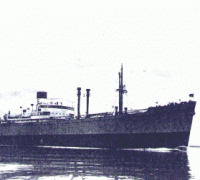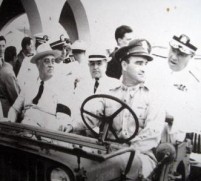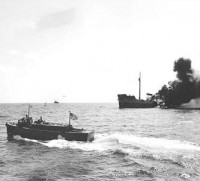- COMMANDER SOUTH ATLANTIC
16)ADMINISTRATIVE READJUST
During November, steps were taken that led to an important organizational adjustment of all U. S. Naval activity in Brazil. As has already been explained, there were, prior to the war, two Naval agencies in the country; the Office of the Naval Attache connected with the Embassy at Rio, and the U. S. Naval Mission to Brazil, working in an advisory capacity to the Ministerio de Marinha. The Naval Attache in 1942 was Rear Admiral A. T. Beauregard, USN. For one thing, the situation in Rio demanded modification. The Naval Attache's office had so much extra work thrown upon it that the normal functions of such an organization were being outgrown and the personnel needed augmenting. The Mission itself, though it was ordinarily a routine peacetime affair, needed a more adequate connection with the Commander South Atlantic Force now that war existed.
On November 5, the Commander-in-Chief informed Admiral Ingram that it was proposed to have the Naval Mission in Rio assume charge of operational functions under the Commander South Atlantic Force that were currently being performed by the Naval Attache's Office. These would include Supply, Communications, Shipping, and Aviation. To better this arrangement, Admiral Beauregard, would be detached as Attache and would become head of the Mission, his relief being the Officer immediately subordinate to him.
Ambassador Caffery immediately came forth with a qualified objection to the plan, for he desired above all to maintain the prestige of the Attache's office. His stipulation was that the Admiral's successor should hold the Rank of Captain at least. Admiral Ingram followed up the Ambassador's objection with a statement of his own to the Vice-Chief of Naval Operations and the Commander-in-Chief, to the effect that he strongly opposed expansion of the Naval Mission to Brazil, both for present and future political reasons.
Admiral King's reply, on November 12, instructed Admirals Ingram and Beauregard to confer and to work out some practical arrangement for coordinating U. S. Naval activities in Brazil, which should include the Naval observers. Three days later Admiral Beauregard was in Recife for a conference with the Commander South Atlantic Force. The result of the interview, which terminated on November 16, was an agreement on several points, as follows: Rio de Janeiro should become a U. S. Naval Operating Base, to include operational functions hitherto under the Naval Attache. Admiral Beauregard should shift from the Naval Attache's office and take over command of the Mission. He should, moreover have another set of orders for additional duty as Commanding Officer of the new NOB Rio.
All those officers who were serving as assistant Attaches should report to the new Chief of the Naval Mission for duty as his assistants, and also for operational duties in the new NOB organization. Since this would involve some changes in the Mission contract with the Brazilian government, Admiral Beauregard should confer with the proper officials and secure their consent to the needed alterations.There was no thought, of course, of any abandonment of the Naval Attache's Office. A suitable officer and subordinates would be provided for this duty. The next point of the agreement was extremely important, since it provided that all Mission Officers should be assigned to extra duty on the Staff of the Commander South Atlantic Force. All naval Observers on the East Coast of South America should henceforth come under the direct orders of the Commander South Atlantic Force. Moreover, in each of their offices there should be one or more Intelligence Officers, working directly under he Office of Naval Intelligence but also maintaining liaison with the Rio Naval Attache and the Commander South Atlantic Force.
Any additional Naval Activities established in Brazil or Uruguay, must come under the jurisdiction of Comsolantfor, who would also be advised of all personnel coming through the area for purposes of observation or survey of matters affecting Naval or Military activities. The arrangements just concluded were understood as being substantially in effect from that moment; however, it was required that Washington make the agreement official, so that the chain of command might be understood and communications properly routed. Two days after the Admiral's conference at Recife, the Brazilian Ministry of Marine gave its advance consent, verbally, to the only necessary change in the Naval Mission Contract. Washington was a little slower, but on the 25th word came from the Cominch that the organization proposed under the Recife agreement was approved and would become effective on December 1, 1942.
In this way a further unification of command was established, and, as per agreement, the new Rio Naval Operating Base was commissioned on December 1. It remained small in personnel, and from the operational standpoint was trivial compared with Recife, which did not advance beyond the technical status of a Facility. But in Rio de Janeiro, as the Capital of Brazil, was entitled to some special consideration. The subsequent history of NOB Rio may as well be briefly considered here. It had grown out of the Naval Attache's office and at first continued to occupy the same quarters, each being located in the Embassy. These two separate organizations continued to grow until their increased personnel imperatively demanded new quarters. They both moved to the Metropole Building, on Avenida Presidente Wilson, where each for a time occupied three half floors.
By November, 1943, the NOB had again outgrown its accommodations, and once more a new location had to be found. The next move was to Avenida Rodrigues Alves, where the Base quarters were established in the top floors of a business building, which continued to be occupied at the present date writing. Admiral Beauregard held the command of both NOB and Mission until May 3, 1943, when he was relieved by Captain Harold Dodd for the Base and by Captain McCauley for the Mission. In June, 1944, Commander E. J. Lanigan became Commandant NOB Rio, relieving Captain Dodd who then took charge of the Mission.
Hyper War Commander South Atlantic Force. U.S. Naval Administration in WW II.



